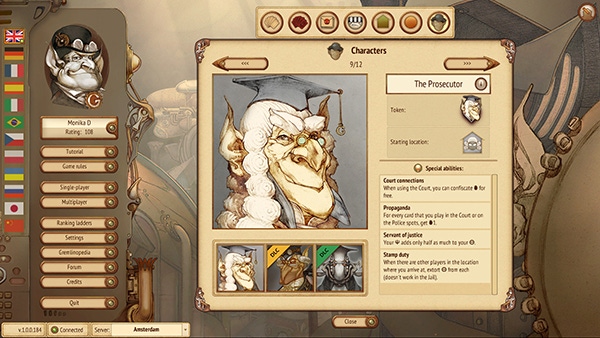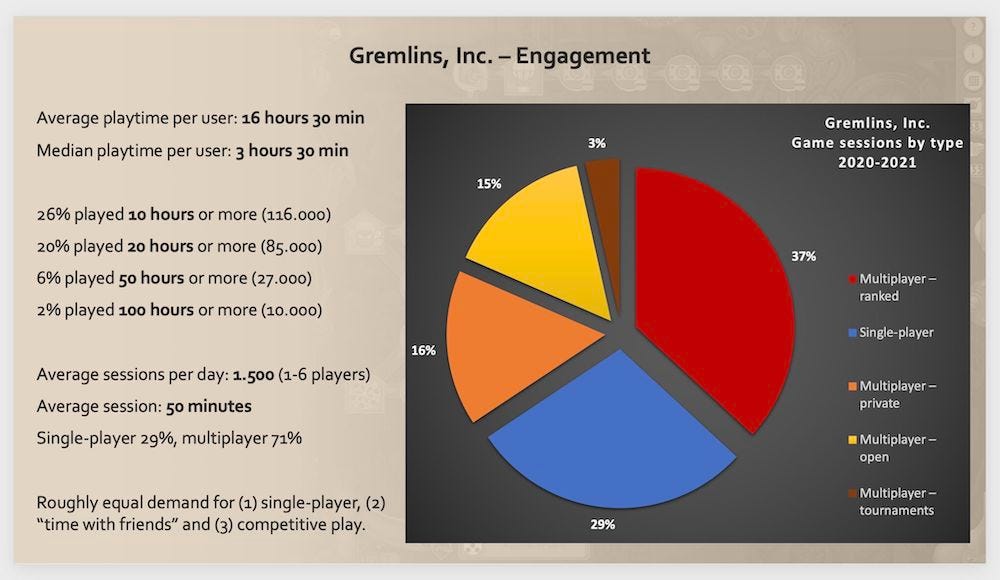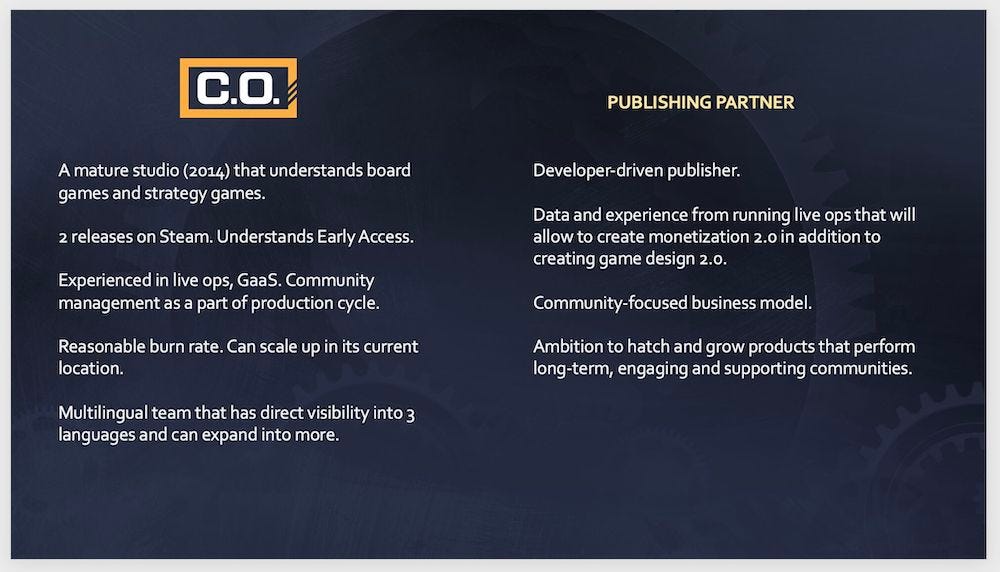Trending
Opinion: How will Project 2025 impact game developers?
The Heritage Foundation's manifesto for the possible next administration could do great harm to many, including large portions of the game development community.

Featured Blog | This community-written post highlights the best of what the game industry has to offer. Read more like it on the Game Developer Blogs or learn how to Submit Your Own Blog Post
Some nice transparency from the Gremlins Inc. 2 devs.

[The GameDiscoverCo game discovery newsletter is written by ‘how people find your game’ expert & GameDiscoverCo founder Simon Carless, and is a regular look at how people discover and buy video games in the 2020s.]
We’re back for your Wednesday newsletter, folks, and we hope you’re having a good one. Recommended listening for this newsletter: this LTJ Bukem drum & bass mix. Recommended drinking? Israel Adesanya presents Tekilla Kiwi Kill Cliff Ignite. (Just kidding, we Googled the weirdest energy drink we could find.)
Our lead story this time out is another guest post from Sergei Klimov, head of studio at Charlie Oscar, following his piece about Spire Of Sorcery’s trials and tribulations. This time, he’s taking an honest look at the in-progress pitch process for their sequel to popular digital strategy board game Gremlins, Inc (5,100 positive Steam reviews!)

So we've been talking to ±15 publishers/investors about Gremlins, Inc. II over the last couple of months. Here's our experience in a nutshell:
Concept: We're pitching a sequel to a game with an audience of 500k on Steam, that still retains high engagement after 6 years of live ops. This is different from, say, pitching an entirely new concept where much less data will be available. Our deck is thus very stat-heavy.
The concept of the sequel is clear. To test it, we explained it to the community in a Steam announcement in Gremlins Inc. itself, which got more likes than we’d ever had before (1,100+). This was a validation of all the key upgrades we plan for the sequel: peer to peer connection for custom multiplayer sessions, team sessions in ranked mode, cards that can be edited for mods & lots more.
Documents: We're sending around a 35-slide deck featuring stats around G1 (see above), the concept of G2, and a comparative table between G1 & G2 with a roadmap. Sometimes people ask for a "detailed GDD" (game design document). But for us, the GDD is a part of the production cycle.
The game’s development depends on the formats we prioritise, and the model (EA / direct to 1.0; Steam-only / multi-platform on PC / Switch / Xbox; mobile as companion / standalone; etc). If we do a GDD now, we don't need a publisher and expertise, we just need an investor. But if you're raising just the money, having a GDD may help as a proof of "ready to start tomorrow!" pole position.
Budget: We're raising €400k to reach Early Access, another €400k for the year of EA, and €200k for the first 6 months of live ops on the sequel. We don't play any ‘little games’ with inflating the budget and then coming back down, or include a bit of profit in there, or even bank on any meaningful revenue in Early Access (we hope! we aim! but we don't think we can *plan* on that). Just one publisher wanted to pay less than we ask - everyone else was perfectly fine with the numbers.
The part we didn't expect is having publishers ask us about what happens when we *double* the funding. Already 3 companies asked if we can deliver a "bigger everything" with €2M or €5M to spend. While we don't really think spending more pre-EA makes sense, and we're looking for a relationship where we can modify production along the way if it’ll help, it is an interesting point.
So if you folks pitch something for €1M, it makes sense to preempt similar questions with slides that cover "what if we have €2M or €3M to spend?"
We improved our ‘ask’: Talking to different companies helped us crystallise our own goals, to the point of creating a "studio/term sheet" deck in addition to a "product deck".
Like the Early Access period helps by mentally processing real player feedback, pitching a game to publishers and investors helps to better understand what you, the studio, really want.
So our ask got clearer: 1. Expertise to help us deliver a better product (a producer!) 2. User acquisition help (ability to find and reach a relevant audience) 3. Budget (money, sometimes also solves for 1.) And crucially, what makes publishers stand apart from investors is the UA expertise/help.
We got deep into product & audience: One of the things that we discovered in our conversations with publishers is that smart publishers always look beyond your product to the audience that it will add to their portfolio. The basic math is that we're raising ±€1M for a product that will ride on the success of the previous game, generating ±€3M+. For investors, this maths is good enough. The sector is hot, the business model is clear, and the risk is moderate.
For publishers, though, there are two questions: does the product align with their existing portfolio? (i.e. how hard will the initial launch be?) and is there a way for the product to expand their existing audience? (i.e. what do we bring to the table, beyond the actual product?)
We found that on the face of it, we're pitching a product – but what's being evaluated is the audience. We have 500k users on Steam, and it pays off to provide a detailed breakdown of reach: 11% of our audience is in Japan, 8% in Russia, 30% in China, etc.
Best case scenario: your product's audience clicks with the publisher’s like two Lego bricks. (For example: the publisher's audience is in U.S./EU, while we deliver a strong Asian following, and everyone's better off.)
We discussed who owns the IP: In our conversations, we had proposals from "you keep the IP, we build a successful release together" to "we only work with studios that hand over their IP", with "we want to have the right to buy the IP from you written into the contract" in the middle.
It feels like decoupling IP from the developer may be driven by the need to add value to a publicly traded company (where shareholders may feel the company grows by owning more IP).
Generally, we felt that the focus on IP early in discussion is a red flag. Funnily enough, it may also give developer an idea that their IP is more valuable on its own than it really is ("it is desirable, thus valuable"). We think the IP is sometimes pursued not as much for its value, as as a way to exert more control in the relationship.
We talked equity - easier than signing a game right now? It may be something very specific to Q1 2022 [and the success of the first Gremlins Inc. game], but in our experience, raising investment for a stake in the studio seems to be much easier than landing a publishing deal.
One reason behind this is probably the source of money. Where companies are public or investor-backed, acquiring a part of the studio immediately translates into growth whereas funding a project is a bet that may or may not work out.
There is a lot of wild money out there! By wild, we mean funding that comes without any synergies, mostly from funds that are just entering the industry. We think of that as a "last resort" option, since then we will still walk alone – just better funded.

We looked at prior experience: We didn't reach out to publishers with whom we had bad prior experience. When we say "bad", it's mostly communication: someone requested 10 keys but didn't activate any, a company changed producers 3 times in a year, and so on.
It doesn't make these companies bad! It just means that specifically for us, trying to successfully hatch a new game with such a level of communication seems impossible. Very often these are fast-growing and/or large companies, pursuing a hit-driven policy in terms of content they release.
We took into account what fellow devs said: When we set out to find a partner, we got a lot of great references. For example, all developers that we know love both Chucklefish and Devolver (maybe they send great Christmas gifts?!), and will refer to them with pleasure. Whenever we got a recommendation like this from a studio we know, we always followed through.
We also got some negative references from dev teams who worked with a particular publisher and chose not to work with them again. We tried to clarify why specifically the developer wouldn't work again with them. In all cases it's been the "lack of": lack of support, lack of staff and lack of faith. Based on that, we did not reach out to those companies.
The window of opportunity was missed: Most of the deals that didn't happen after initial discussions didn't happen due to the partners we were interested in being busy with other titles in 2022-2023.
What we loved the most is the approach where a producer on the publisher's side "owns" each product, and is responsible for seeing it grow. However, you cannot clone good producers. Thus, any such team has a hard limit on the number of new projects they can carry at a time.
Our takeaway is that a studio like ours needs to be in touch with these publishers every 6 months, having a "catch up" call. No action points, just sharing plans. The same applies to the potential investors, by the way. You don't wake up on Monday and say "now is the good time to take an investment".
However, like many other dev teams we are simply too focused on the actual production to think of this, and too shy to call people with nothing specific to talk about. This, by the way, seems like the point where agencies may help a lot - by always keeping their ears to the ground on both sides of the industry.
Everyone’s real busy right now: We still have to meet a person in the industry who is not very busy. Where your project resonates, you get more attention, but the general environment is that most people's inboxes are on fire – with so much investment and growth in the industry.
If someone doesn't come back to you, it's not a "No", it's a "I have 5 projects competing for my time" situation. We resorted to weekly reminders, and consider the contact "gone" if nothing moves forward much after a month.
As of a few weeks back, we had 4 discussions that are progressing at different speeds. One involves a possible acquisition of the studio, and three are product-focused. We are also considering an application for EU funding as the "5th deal". This was out of 16 approaches we made.
What helps us orient ourselves is understanding the other party's ultimate interest, and whether it aligns with ours. What's our game to this possible partner, really?
If the company is publicly traded, what does the management want? Revenue, profit, sometimes internal strategic goals. Horizon? 2-3 years. If the partner is private, what do they want? Stronger portfolio, profit, sustainable cooperation. The horizon? From 2 to 6 years. Who makes the decision, and who will really get the credit for success or failure of this deal? And will they be still around in 2 years?
Essentially, the deal is about aligning interests at every level:
individuals on the dev team can aim for a great product and profit share.
the studio to aim for long-tail profit via 5-year deal where the release is just a mark on the timeline, and not the final milestone - after which motivation decreases.
the publisher to aim for success through ‘skin in the game’. If shelving your game bears no risk, or if a success is too minor to care about, you are not truly aligned.
As a summary of the whole adventure, we can say this: "It's a quest for finding a partner that adds leverage to your studio - with interests that closely align with your own". Everything else is really just technicalities. You deliver product and communication. They deliver reach and sales, and capital. And you work together as one team!
[Thanks to Sergei for providing this! This piece was adapted from a multi-part series on Charlie Oscar’s LinkedIn page. So feel free to check them out for a few other details we didn’t have space to include - plus new insights.]
[We’re GameDiscoverCo, a new agency based around one simple issue: how do players find, buy and enjoy your premium PC or console game? We run the newsletter you’re reading, and provide consulting services for publishers, funds, and other smart game industry folks.]
Read more about:
Featured BlogsYou May Also Like